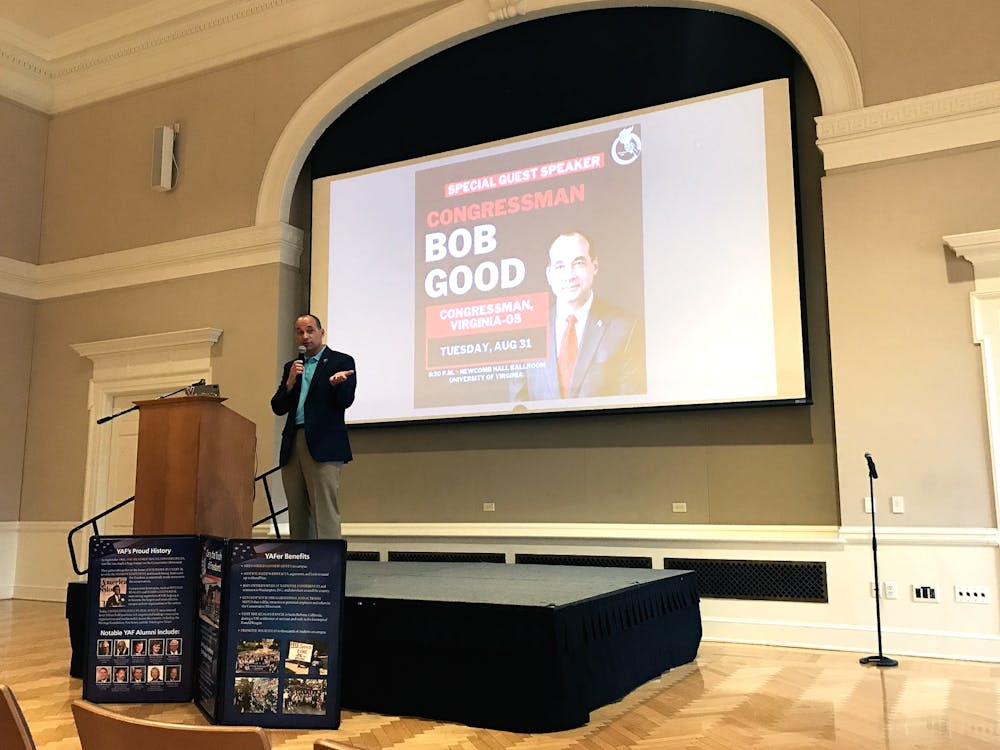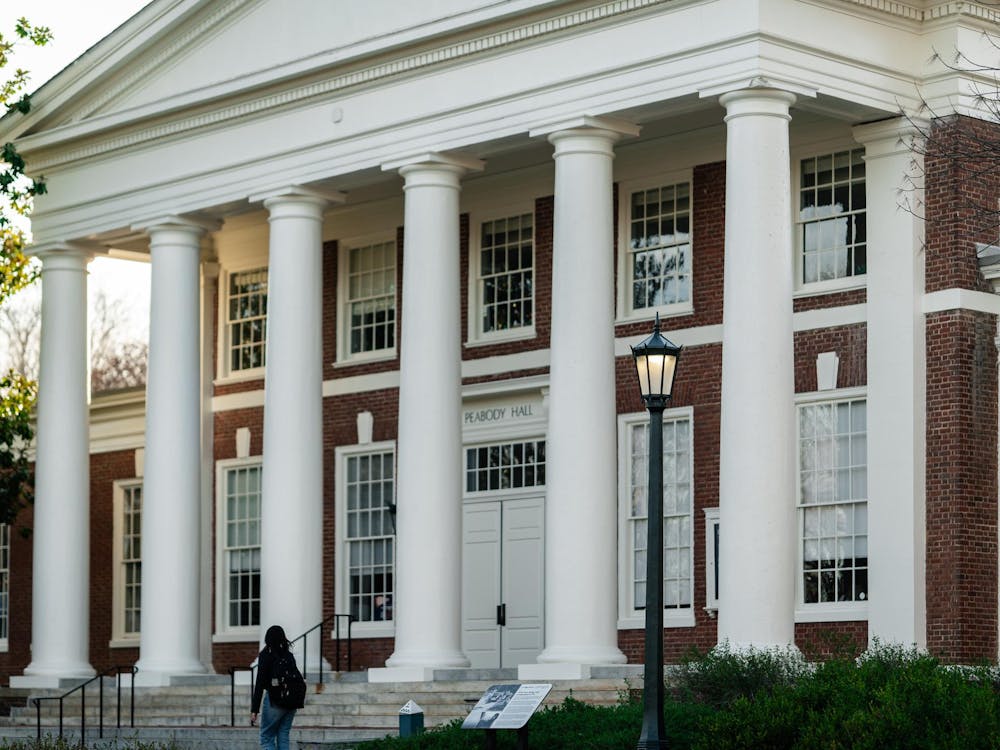Congressman Bob Good visited the University Tuesday to discuss current events and conservative values for an event held by the Young Americans for Freedom at U.Va. Good represents Virginia’s 5th U.S. congressional district — the Commonwealth’s largest district — which includes Charlottesville, the University and the entirety of Albemarle County and as far south as Danville to as far north as parts of Fauquier County. About 20 students attended the event.
Good, who identifies as a “bright red, biblical and constitutional conservative,” is an alumnus of Liberty University. In the 2020 Republican nomination race for the House of Representatives, Good ran against incumbent Denver Riggleman and defeated him with 58 percent of the vote. Riggleman was recently selected to serve as a senior staff member on the House select committee — which will investigate the events of the Jan. 6 Capitol riots, when supporters of then-President Donald Trump stormed the U.S. Capitol complex.
Good went on to beat Dr. Cameron Webb, a University alumnus, in the November general election. Webb serves as White House senior policy advisor for COVID-19 equity under the Joe Biden administration.
Nickolaus Cabrera, chairman of YAF and second-year College student, introduced Good and highlighted the many conservative principles Good maintains, such as his defense of the First and Second Amendments, pro-life values and support of strict immigration laws.
Good began his speech by first speaking on the future of politics in Virginia and the role of government.
“I hope that you realize, as conservatives, that we truly are at war with the future of our country,” Good said. “The whole country is looking at Virginia.”
As Virginia holds state and local elections during off-years, this November, Virginians will elect a governor, lieutenant governor, attorney general, representatives to the House of Delegates and some local offices. Virginia — solidly a red state until the early 2000s — has transformed from a purple state to solidly blue in the last few years. The last time the state backed a Republican presidential candidate was 2004.
Still, Good said he believes there is a chance for a “red wave” this November. The Democratic gubernatorial nominee Terry McAuliffe holds roughly between a three to five point lead according to different polls. McAuliffe was the governor of Virginia from 2014 to 2018 — Virginia governors can’t run for two consecutive terms — and now intends to serve again, running against Republican nominee Glenn Youngkin. McAuliffe defeated four other candidates with 62 percent of the vote in the Democratic gubernatorial primaries.
“When I say we’re at war with the future of our country, what are the things that matter most?” Good asked the audience. “What are the greatest threats to our country? What is the number one responsibility of our government?”
According to Good, the answer to this question is “safety and security,” which he claimed Democrats “threaten” when it comes to the police force and immigration at the border.
“We absolutely have a border invasion on the southern border right now,” Good said. “[We have] an administration that has shown no desire or willingness or interest to secure our border, to vet folks, to enforce our laws at the border, to stop people based on COVID, to stop people based on criminal backgrounds.”
Good has previously called Biden’s border policies “a national security crisis.” While the Biden administration has seen a surge in migrants, it has also implemented efforts to “identify, disrupt and prevent” criminal organizations. Immigrants are also less likely to engage in criminal activity than native American citizen.
Good also called H.R.1 — otherwise known as the “For the People Act” — another threat to the country. H.R.1, an act aimed at expanding voting rights, was originally introduced by Maryland Representative John Sarbanes in 2019 and passed in the House of Representatives in March 2021 before being blocked by Senate Republicans through the filibuster.
“It would prohibit photo ID, it would prohibit signature matches, it would authorize and make it where you couldn’t prevent unsolicited mass mail ballots,” Good said.
The act does not does not prohibit photo ID requirements outright. Instead, it requires states to offer additional procedures for voters who do not have ID — namely an affidavit of identity, signed under a penalty of perjury — to allow them to cast their vote. H.R.1 also does not authorize mass mail-in ballots — it requires states to give every individual access to voting by mail if they so desire it. Researchers have found that there is little evidence suggesting voting by mail increases voter fraud.
Good then spoke about the COVID-19 pandemic, harshly criticizing many of the public health measures, including the University’s vaccine mandate for students. Many of Good’s comments about the pandemic have drawn criticism from his constituents. In December, Good called the pandemic “phony,” and in July 2021, he signed his name to H.R.2317, the “We Will Not Comply” Act, which would end federal funding for any school which enacts a vaccine mandate and more broadly would prohibit federal funds from being used to enforce vaccine requirements.
“If the government never said ‘COVID,’ if the media never said ‘COVID,’ if we had no restriction[s], no more masks, [if] we didn't talk about vaccines … [if] we were just living, how many of us would know that there was a pandemic?” Good said.
The COVID-19 pandemic has resulted in over 600,000 deaths in the United States and over 4.5 million deaths globally since the first case emerged in November 2019.
Good also criticized the controversial mandate that vaccinated members of Congress must continue to wear masks even if they are vaccinated, denouncing Speaker of the House Nancy Pelosi for mandating masks when she failed to wear one at a hair salon and claiming that “masks have never been shown to make any difference.”
While the Center for Disease Control has been criticized for its confusing mask mandates throughout the pandemic, studies have found that widespread use of masks is effective in preventing the transmission of coronaviruses and influenza viruses.
The event ended with Good taking questions from the audience. One student asked how Good recommended “[tak[ng] back control of the federal government,” to which Good advocated for involvement at local levels, like school boards, and keeping control in the hands of citizens.
“There's no substitute for the hard work of it,” Good said. “In a free country, when the people fear the government, that's tyranny. When the government fears the people, that's how it should be.”
Another student asked Good if he could provide any examples of hypocrisy in government. In response, Good addressed vaccine mandates again, saying that it is hypocritical of the government to “require vaccine cards” while also “enforcing voter ID.”
The White House has previously said that it will not require a federal vaccine mandate, and instead expects the private sector to drive their own vaccine policies.
Good finished the event by again encouraging attendees to “stand together” as conservatives on Grounds and criticizing the lack of bipartisanship in Congress.
After the event, first-year College student Callahan Burton reflected on Good’s speech and what he had taken away from it.
“I definitely think there’s a problem in this country with a lack of civil discourse,” Burton said. “I plan on going to [a UDems] interest meeting just to kind of see what both organizations are about, and if I can be some kind of avenue to open a channel of civil discourse between the two groups, I’d love to do that."







